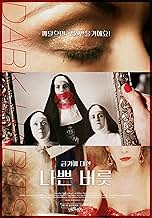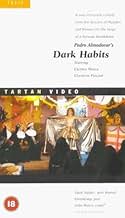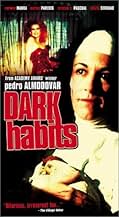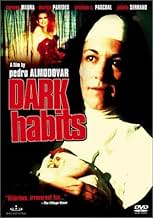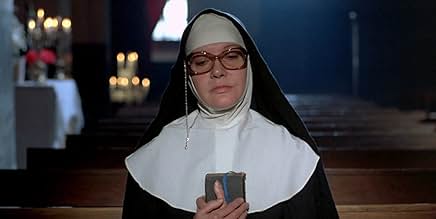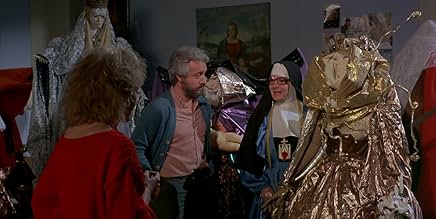CALIFICACIÓN DE IMDb
6.5/10
8.8 k
TU CALIFICACIÓN
La cantante de un club nocturno busca refugio en un peculiar convento de Madrid cuando su novio muere de una sobredosis.La cantante de un club nocturno busca refugio en un peculiar convento de Madrid cuando su novio muere de una sobredosis.La cantante de un club nocturno busca refugio en un peculiar convento de Madrid cuando su novio muere de una sobredosis.
- Premios
- 1 premio ganado y 1 nominación en total
Cristina Sánchez Pascual
- Yolanda
- (as Cristina S. Pascual)
Miguel Zúñiga
- Madero
- (as Miguel Zuñiga)
Mary Carrillo
- Marquesa
- (as Mari Carrillo)
Rubén Tobías
- Policía
- (as Ruben Tobias)
Concha Grégori
- Sofia
- (as Concha Gregori)
Ángel Sánchez Harguindey
- Periodista
- (as Angel S. Harguindey)
- Dirección
- Guionista
- Todo el elenco y el equipo
- Producción, taquilla y más en IMDbPro
Opiniones destacadas
This film made after Almodovar's first more upbeat outrageous films, is a film that tells of the end of the Movida Madrilenia, a movement existing in the early eighties in Madrid that was defined by a mixture of new romantic punk and pop, and the ironic use of Spanish folklore and the 'housewife' culture. When people in this subculture started to commonly use heroine, the downfall of the movement had begun. This film is about the choices that people had to make at the end of this era. some stayed junkies, others died, some went back to the small towns where they had moved from, others went on to give up on drugs and become more constructive. The convent where the nuns reside can be interpreted as the habitation of this irreverent movement, frequented by police searches, dealers, artists, and junkies. The movie has some great musical moments which indicate that Almodovar might one day take his hand to this genre. The religious element interwtined with (homo)sexuality will certainly be proliferated again in the forthcoming movie La Mala Educacion. The movie also contains a cameo of a Spanish 'Harrold Robbins' type of writer, who is featured sitting at one of the tables wiping her mouth with a handkerchief as Yolanda sings in a night club at the beginning of the movie. This authopr refers to the character of sister Rata de Callejon, who has a secret career as trashy novel writer. The film is somewhat darker than most of Almodovar's early movies, but is very gentle, provides enough comedy and the characters above all remain very human, all of them have their virtues and vices.
"Entre tinieblas": "In the Dark" maybe "Wondering about", "Somebody that has lost his/her way" would be the closest translation to the Spanish title.
"Dark Habits" is so parochial, so banal, that changes completely the message of this movie.
I just saw it today, out of nostalgia, since I own a copy, but very seldom I see a movie more than once.
Throughout the years I've seen this one three times! Every time it excels the last view. It isn't the best Almodovar. At the time he didn't have the money (and therefore the incredible terseness of his more recent filmography) nor the experience to make a work of art of every single frame, as he has accustomed us during the last several years. But this films grabs you from the very beginning with such guts that it's impossible to point out its formula.
It's simply magic.
Cristina Sánchez Pascual is not Greta Garbo, but again, like the movie itself, she has "something" in her personality that mesmerizes you whenever she's on the screen.
The way Chus Lampreave ("Sor Rata de Callejón" or "Sister Rat of the Back Alley") delivers her lines is comparable to the way Carol Channing or Eartha Kitt used to delivered theirs: Sheer pleasure to the ears and the brain.
I don't know how it could sound to somebody that needs to read the translation, but for a Spanish speaking person this woman is unique. She could read the telephone book and make it irresistibly funny.
The character of the Marquess (Mary Carrillo) is Almodovar 100%, when she comments to the Abbess Julia: "I'm a cosmetician", "¿Really?", "Of course, see my face?" and she shows an incredibly clownish face that only an inebriated cosmetician would have done.
And the Bolero that Lucho Gatica sings --"Encadenados" "Chained Together"-- is simply so gorgeous that one could melt on the spot out of utter delight, I swear. (I have to find it on "You Tube"!!).
This movie doesn't deserve 8 points, I simply gave it 8 points in my vote because of its masterly ways to grab one's imagination with not too many resources. I adore this movie. It's imperfect, the photography is not very good, the acting leaves a lot to be desired, the sets are in general quite poor..., the script...MMM-mmm, but the movie is sublime!!
"Dark Habits" is so parochial, so banal, that changes completely the message of this movie.
I just saw it today, out of nostalgia, since I own a copy, but very seldom I see a movie more than once.
Throughout the years I've seen this one three times! Every time it excels the last view. It isn't the best Almodovar. At the time he didn't have the money (and therefore the incredible terseness of his more recent filmography) nor the experience to make a work of art of every single frame, as he has accustomed us during the last several years. But this films grabs you from the very beginning with such guts that it's impossible to point out its formula.
It's simply magic.
Cristina Sánchez Pascual is not Greta Garbo, but again, like the movie itself, she has "something" in her personality that mesmerizes you whenever she's on the screen.
The way Chus Lampreave ("Sor Rata de Callejón" or "Sister Rat of the Back Alley") delivers her lines is comparable to the way Carol Channing or Eartha Kitt used to delivered theirs: Sheer pleasure to the ears and the brain.
I don't know how it could sound to somebody that needs to read the translation, but for a Spanish speaking person this woman is unique. She could read the telephone book and make it irresistibly funny.
The character of the Marquess (Mary Carrillo) is Almodovar 100%, when she comments to the Abbess Julia: "I'm a cosmetician", "¿Really?", "Of course, see my face?" and she shows an incredibly clownish face that only an inebriated cosmetician would have done.
And the Bolero that Lucho Gatica sings --"Encadenados" "Chained Together"-- is simply so gorgeous that one could melt on the spot out of utter delight, I swear. (I have to find it on "You Tube"!!).
This movie doesn't deserve 8 points, I simply gave it 8 points in my vote because of its masterly ways to grab one's imagination with not too many resources. I adore this movie. It's imperfect, the photography is not very good, the acting leaves a lot to be desired, the sets are in general quite poor..., the script...MMM-mmm, but the movie is sublime!!
Maybe the one line summary is wrong, that's the problem with Pedro Almodovar's flick, you don't know what its supposed to be: ironic, satire, parody, black comedy or a serious drama. It's got a lounge singer hiding out in a convent (remember this is a 1983 movie, made way before Sister Act) after her lover ODs. The nuns are former losers, street trash, etc. who are given punishable names like Sister Rat-in-the-Sewer or Sister-Damned and their Mother Superior shoots up heroin. Are they making fun of Catholics or what? Nevertheless, this is a bit funny, while being a little boring. Recommended to the Almodovar/Spanish/foreign fans who shouldn't expect this one to be better than his usual films.
"Dark Habits" from 1983 was Pedro Almodovar's first film made with a decent producer, film company, and budget.
There are signs of his later brilliance in films like "Woman on the Verge of a Nervous Breakdown" and "All About My Mother," but even for the quirky Almodovar, this is one strange film.
"Sister Act" is vaguely reminiscent of this movie, only in the fact that "Dark Habits" concerns Yolanda, a nightclub performer (Cristina Sánchez Pascual) whose boyfriend (Will More) overdoses while she's in his apartment.
Yolanda panics, afraid she will be accused of killing him by the police, so, wearing her red sequined gown, she hides out in a Madrid convent.
This is unlike any convent depicted before or since. Some of the nuns, like Yolanda herself, are drug addicts, doing heroin and coke. One nun has a pet tiger. Another writes sexy novels under a pseudonym. Another nun designs fashions and is in love with the local priest.
The Mother Superior is a lesbian and falls in love with Yolanda. The nuns all have strange names, depicting that man is the lowest form of animal: Sister Snake, Sister Rat, etc.
The big problem at the convent at the moment is that the Marquesa (Mary Carillo), now that her generous husband is dead, has decided to withdraw patronage from the convent. One of the nuns gets information about the Marquesa's daughter and decides to blackmail her with it.
"Dark Habits," I believe, suggests the Movida Madrilenia, a hedonistic countercultural movement that took place in Madrid after the death of Franco.
It was meant to represent a new Spanish identity, an identity characterized by freedom of expression, use of recreational drugs, and even a new dialect.
It was a hedonistic culture that more or less destroyed itself by the overuse of heroin. At the end of the era, Madrid was left with drug addicts, dead junkies, people leaving Madrid for their original hometowns, and for others, rehabilitation and a useful life.
The convent serves as a microcosm of this movement. Here one sees art, drugs, music, and homosexuality.
A fascinating if sometimes uncomfortable film, and certainly not representative of the later Almodovar, who himself has distanced himself from this offbeat, dark film.
There are signs of his later brilliance in films like "Woman on the Verge of a Nervous Breakdown" and "All About My Mother," but even for the quirky Almodovar, this is one strange film.
"Sister Act" is vaguely reminiscent of this movie, only in the fact that "Dark Habits" concerns Yolanda, a nightclub performer (Cristina Sánchez Pascual) whose boyfriend (Will More) overdoses while she's in his apartment.
Yolanda panics, afraid she will be accused of killing him by the police, so, wearing her red sequined gown, she hides out in a Madrid convent.
This is unlike any convent depicted before or since. Some of the nuns, like Yolanda herself, are drug addicts, doing heroin and coke. One nun has a pet tiger. Another writes sexy novels under a pseudonym. Another nun designs fashions and is in love with the local priest.
The Mother Superior is a lesbian and falls in love with Yolanda. The nuns all have strange names, depicting that man is the lowest form of animal: Sister Snake, Sister Rat, etc.
The big problem at the convent at the moment is that the Marquesa (Mary Carillo), now that her generous husband is dead, has decided to withdraw patronage from the convent. One of the nuns gets information about the Marquesa's daughter and decides to blackmail her with it.
"Dark Habits," I believe, suggests the Movida Madrilenia, a hedonistic countercultural movement that took place in Madrid after the death of Franco.
It was meant to represent a new Spanish identity, an identity characterized by freedom of expression, use of recreational drugs, and even a new dialect.
It was a hedonistic culture that more or less destroyed itself by the overuse of heroin. At the end of the era, Madrid was left with drug addicts, dead junkies, people leaving Madrid for their original hometowns, and for others, rehabilitation and a useful life.
The convent serves as a microcosm of this movement. Here one sees art, drugs, music, and homosexuality.
A fascinating if sometimes uncomfortable film, and certainly not representative of the later Almodovar, who himself has distanced himself from this offbeat, dark film.
Finally saw this film today. I laughed out loud many times. It's just so wonderfully outrageous. The nuns are played by actresses that went on to play leads in Almodovar's later films: Women on the Verge, All About My Mother, etc. The actress who plays Sister Rat figures prominently, which made me very happy, as she has had mostly very minor roles in his subsequent films. She first came to my attention in Talk To Her. She plays the concierge, and asks the reporter why her tenant is in jail. The reporter says he's innocent. She replies, I know, but innocent of what? She has right-on deadpan delivery that just knocks you out, and it's on full display in Dark Habits.
The film is less neatly constructed than Almodovar's later works, and one might say the ending is somewhat messy. Still, it's interesting to compare it to his incredibly polished work of the last ten years. While the uninitiated (to Almodovar) may find parts of it a little shocking, it's not nearly as raw as it would be if it were made today--certainly the lesbianism is tame by today's standard.
Other reviewers are right that a lot of the English subtitles miss the ironic tone in the script. But don't let that stop you . . . It's Almodovar! Even second tier Almodovar with inadequate subtitling is better than 99 percent of everything else!
The film is less neatly constructed than Almodovar's later works, and one might say the ending is somewhat messy. Still, it's interesting to compare it to his incredibly polished work of the last ten years. While the uninitiated (to Almodovar) may find parts of it a little shocking, it's not nearly as raw as it would be if it were made today--certainly the lesbianism is tame by today's standard.
Other reviewers are right that a lot of the English subtitles miss the ironic tone in the script. But don't let that stop you . . . It's Almodovar! Even second tier Almodovar with inadequate subtitling is better than 99 percent of everything else!
¿Sabías que…?
- TriviaPedro Almodóvar's first film to have a proper producer and be made for a proper film company, rather than be made on the hoof like his previous projects. Almodóvar has since distanced himself from the film as he felt that he had to bow to commercial considerations.
- ErroresThe "Salí porque salí" song is obviously not sung by Yolanda nor the backing vocalists.
- ConexionesReferenced in El Coleta & Jarfaiter: El Piko 3 (2014)
- Bandas sonorasSalí porque salí
Written by J. Curiel Alonso
Arranged by Miguel Morales
Performed by Sol Pilas
Edited by Música Latina N.Y. (USA)
Selecciones populares
Inicia sesión para calificar y agrega a la lista de videos para obtener recomendaciones personalizadas
- How long is Dark Habits?Con tecnología de Alexa
Detalles
- Tiempo de ejecución1 hora 54 minutos
- Mezcla de sonido
- Relación de aspecto
- 1.66 : 1
Contribuir a esta página
Sugiere una edición o agrega el contenido que falta

Principales brechas de datos
By what name was Entre tinieblas (1983) officially released in India in English?
Responda
![Ver Tráiler [VO]](https://m.media-amazon.com/images/M/MV5BZTI5ZGZmNGEtZmM0Mi00ZmUxLWI0ZGMtMmZmODQ0NDQzMTY5XkEyXkFqcGdeQXRyYW5zY29kZS13b3JrZmxvdw@@._V1_QL75_UX500_CR0)
